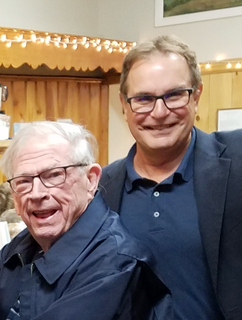A Quote by Don Yaeger
Leadership belongs to all of us. I'm a big believer in John Maxwell, a leadership speaker and author, who talks about the 360-degree leader. Before leading others, you have to learn to lead yourself. Wherever you work in an organization you have to learn to lead up, lead down, and lead side to side. Leadership belongs to all of us. You have to see yourself, and believe in yourself in the way that we are talking about here to give to those that you lead.
Related Quotes
Control is not leadership; management is not leadership; leadership is leadership is leadership. If you seek to lead, invest at least 50% of your time leading yourself-your own purpose, ethics, principles, motivation, conduct. Invest at least 20% leading those with authority over you and 15% leading your peers. If you don't understand that you work for your mislabeled 'subordinates,' then you know nothing of leadership. You know only tyranny.
Leadership: Here is the heart and soul of the matter. If you look to lead, invest at least 30% managing those with authority over you, and 15% managing your peers. Use the remainder to induce those you 'work for' to understand and practice...lead yourself, lead your supervisors, lead your peers, and free your people to do the same. All else is trivia.
The book is actually called 'A Mentor Leader, a Different Way to Lead.' It really talks about my experience in the way I tried lead our football team, things that I learned from, basically, the coaches that I played for and my parents about leadership. And it is a little bit different, counter to maybe what society says about great leaders.
My view is that leadership is not about position - you can lead very well with no one reporting to you in a hierarchy and you can lead quite poorly with many people below you in the traditional chain of command. Leadership is about mobilizing people toward valued goals, and anyone can do this, in any aspect of life.
When you coach and teach leadership, most people think about them. It's like you're the leader and how do you influence them. Clearly, leaders do take their followers, their flock, their enterprise, their business - whatever - hopefully to a better place. But I think the foundation of what makes really great leaders is they lead themselves, and they're conscious about knowing themselves and coaching and leading themselves in a very profound way. The simplest of us talk to ourselves. The question is, "Do we really lead ourselves?"
Christianity enhanced the notion of political and social accountability by providing a new model: that of servant leadership. In ancient Greece and Rome no one would have dreamed of considering political leaders anyone's servants. The job of the leader was to lead. But Christ invented the notion that the way to lead is by serving the needs of others, especially those who are the most needy.
That's the thing about love - it's full of possibilities. It can lead you down so many different paths. Sure, for some of us, it can lead to sadness and regret. But, for others, well, for others it can lead them to the greatest future they could've ever hoped for. Love is the most possible thing in the world.
































